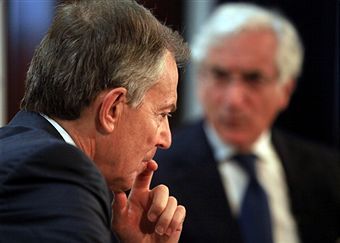 To an extent, British politics is still determined by whether or not you agree with Tony
Blair. For more than a year, the coalition and the opposition have been debating whether to continue Blair’s public service reforms; this is a testament to his failure as Prime Minister as
much as it to his success. Today, has given an interview to the Times (£), coinciding with the release of his
memoirs in paperback. He uses it to question the Labour party’s current journey back into “nostalgia”. He says:
To an extent, British politics is still determined by whether or not you agree with Tony
Blair. For more than a year, the coalition and the opposition have been debating whether to continue Blair’s public service reforms; this is a testament to his failure as Prime Minister as
much as it to his success. Today, has given an interview to the Times (£), coinciding with the release of his
memoirs in paperback. He uses it to question the Labour party’s current journey back into “nostalgia”. He says:
“The attraction of a concept like Blue Labour is it allows you to say that there’s a group of voters out there we can’t reach at the moment, so what we should do is really empathise with their plight. But I think you should always offer a way forward for the future. The way the Labour Party wins, is if it’s at the cutting edge of the future, is if it’s modernising. It won’t win by a Labour equivalent of warm beer and old maids bicycling.”
This chimes with the observations he made about the demise of New Labour in the epilogue of A Journey, adding, perhaps, to the sense that he sympathises with the coalition (but probably only where it agrees with him). He reiterates that he would not have introduced a 50p tax and said that it is vital to “favour entrepreneurs and enterprise”, echoing David Cameron’s rhetoric about the necessity of a reform programme that defeats the “enemies of enterprise”.
Blair’s troubles began in Europe, or some of them did at least. The memory of vetoes and budget rebates expended in the cause of closer integration live long. But, despite that and the EU’s recent ruptures, Blair is still a believer. He says:
“We won’t have the weight and influence a country like Britain needs unless we’re part of that European power as well. Europe has got a fantastic opportunity, but only if it’s prepared to reform and change radically in the way it works.”
The answer, according to Blair, is to embolden the EU Presidency by making it an elected post. Here, Blair is isolated. Brussels was reluctant to democratise the EU Presidency for fear of weakening the Commission and the Parliament; its position has not changed. In Britain, Labour’s stance on Europe is confused and the Tories are unconcerned by the prospect of a two-speed Europe. As one government aide recently put it to me: “With there being member states who aren’t signatories to the euro and Schengen and so forth, it’s multi-speed already.”
Blair is realistic to concede that his proposals have no chance of acceptance at this stage; but he hopes that a generational shift will bring Europe closer together in the future. “My children’s generation see that the rationale for Europe today…is about power,” he says. With rumours of further financial instability abounding and some member states intent on a path self-interest, ‘European power’ looks little more than a spectre at present: a point made powerfully by Philip Stephens in the latest issue of the Spectator, which is out today (subscribe here).






Comments